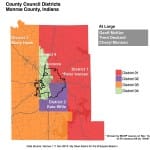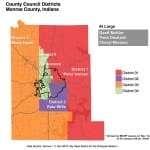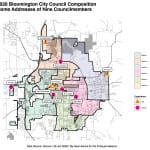Redistricting question served up to state legislators, talk turns again to local issue




On Saturday, the League of Women Voters and the Greater Bloomington Chamber of Commerce hosted the second in a series of three events tied to the General Assembly’s session calendar, which concludes in mid-March this year.
Like the first such event, held in late January, the idea of re-districting at the local level got some airtime.
The updates are designed as a chance for state legislators representing Monroe County area districts to brief constituents on their work as state lawmakers. The three dozen people who attended had a chance to ask questions.
A question this Saturday reprised a theme from first legislative update held in late January—redistricting reform. It’s a timely issue because redistricting is tied to the decennial census. Census Day this year is April 1.
The two Democrats and two Republicans who appeared on Saturday agreed that the state legislative maps that were based on the result of the 2000 census were drawn by Democrats, designed to enhance prospects of Democrats.
Their opinions diverged on the significance of subsequent election results and the impact of the maps drawn 10 years later in 2010. Republicans have a better than two-thirds majority in both chambers of the legislature.
Rep. Jeff Ellington, a Republican who represents District 62 in the state house, chalked up the relative proportion of Democrats and Republicans in the General Assembly to the fact that Indiana voters prefer the policies put forward by Republicans. Rep. Matt Pierce, a Democrat who represents District 61 in the state house, disagreed, saying it’s not as simple as “Hoosiers like Republicans more.”
Ellington also raised a point that he’d made at the late January update: City councils across the state could form independent redistricting commissions to handle the drawing of city council district boundaries as a way to demonstrate how it could be done on the state level.
Local redistricting is a topic that Bloomington’s city council president Steve Volan had been thinking about before Ellington challenged local officials last month to show state legislators how it could be done.
But Ellington’s remarks have provided a bit of impetus to the conversation.
At a community event held on Feb. 2 at the Monroe County Public Library, Volan circulated his proposal for a local redistricting commission, based on a state level proposal that’s been pitched by the League of Women Voters.
Volan’s proposal swaps in the names of state level entities for local entities throughout the document.
For example, under Volan’s proposal, it would be the the city clerk, not the Legislative Services Agency, that would establish and maintain an on-line process for Indiana voters to apply for commission service.
It would be a nine-member local commission that Volan imagines would determine the boundaries of the six city council districts. The nine would be be randomly drawn from a group of 18 people, three from a pool of six candidates each. The three six-member pools would consist of Republicans, Democrats and independent voters, reflecting the racial, ethnic, gender, age, and geographic diversity of the city.
The group of 18 would be chosen by the executive committee of the city council, which is made up of the president, vice president and parliamentarian. This year the executive committee is made up of Volan, Jim Sims (vice president) and Isabel Piedmont-Smith (parliamentarian).
There’s one aspect of the LWV state level proposal that Volan acknowledges doesn’t have a local counterpart: the Indiana Supreme Court. It’s the Supreme Court that is identified by the LWV as the entity that would resolve any dispute between the legislature and the redistricting commission about the final map. In his draft, Volan has, for now, slotted in Monroe County’s board of commissioners as the arbiter of such a dispute.
A city redistricting commission would not have anything to say about how the four county council districts are re-drawn. That was a point Volan made when a question was asked at the Feb. 2 meeting about possible implications for county council districts.
But Volan added that if a redistricting commission were established for determining county council districts, the city and county redistricting groups could both could be trained at the same time and learn at the same pace, even though their geographical purview would be different.
County councilor Geoff McKim said at the Feb. 2 meeting that if the city adopts a model for establishing a redistricting commission for city council districts, then the county commissioners could certainly choose to use the same model for county council districts—if constituents make their voices heard on the issue. McKim is one of the three at-large county councilors, so the shape of county council districts would not affect him.
Asked last week about the idea of establishing an independent redistricting commission for county seats, president of the county commissioners, Julie Thomas had a generally positive reaction. “I know we would take whatever comes out of it seriously, and it would be helpful for us,” Thomas said. Thomas added, “It’s something for us to look into. And I’m happy to look into it, and happy to hear from the county council if that’s something they want us to do.”
Volan concluded his remarks at the Feb. 2 meeting by stressing that the process for establishing precincts, the building blocks out of which districts get built, is the first step. That means it’s really a two-year process locally, starting in 2021, which means local redistricting commissions should be established before the end of 2020. “The sooner you start, the better,” Volan said.
Volan previously told The Square Beacon that getting an independent redistricting commission established is one of his goals for 2020 as council president.




Comments ()